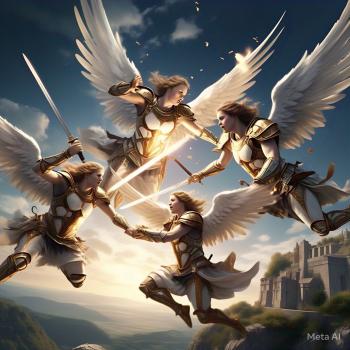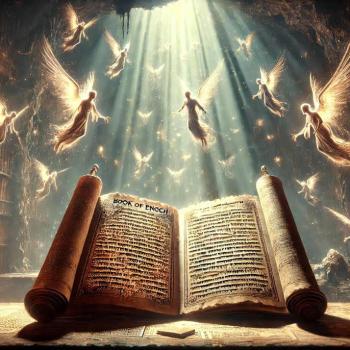God always tells his people about anything important he is going to do with them. Isaiah states this principle by quoting, “I am God, and there is no one like me, declaring the end from the beginning and from ancient times things not yet done” (Isa 46.9-10; cf. 48.3-5). Amos echoes it, saying, “the Lord God does nothing, without revealing his secret to his servants the prophets” (Amos 3.7).
God does this mostly with prophecy. But he also does it with types, which are obscure. A type is a person, object, historical event, or institution that represents, symbolizes, or prefigures something else, often of like nature, which usually happens in the future, called an “antitype.” A type is a symbol or a sign that is fulfilled in the future by its antitype. One of the most beloved Bible stories is about Jonah being swallowed by a large fish for three days and living to tell of it. Jesus cited it as a “sign,” that is, a type, of his resurrection on the third day (Mt 12.40; 16.4). Thoreau said, “It’s not what you look at that matters, it’s what you see.” Indeed, seeing types and antitypes strengthens faith in the sovereign God of Jacob.[1] Minor details of a historical narrative with a type may not fit its antitype, but major details will.
It is well recognized that the patriarch Jacob was a type of the nation which came from his loins, and that is why God renamed him Israel (Gen 32.28). But it has been little recognized that Jacob’s two most important encounters that he had with God were types of Jesus’ first and second advents.
The first type began when Jacob’s father “Isaac called Jacob and blessed him, and charged him, ‘You shall not marry one of the Canaanite women. Go at once to Paddan-aram [Haran] … and take as wife from there one of the daughters of Laban, your mother’s brother. May God Almighty bless you and make you fruitful and numerous, that you may become a company of peoples…. So that you may take possession of the land where you now live as an alien’” (Gen 28.1-4).
So we read next, “Jacob left Beer-sheeba and went toward Haran. He came to a certain place and stayed there for the night,… And he dreamed that there was a ladder set up on the earth, the top of it reaching to heaven; and the angels of God were ascending and descending on it” (Gen 28.10-12). God stood above the ladder and spoke to Jacob, confirming his covenant with Abraham, Isaac, and Jacob, to give them a numerous people and a land in which “‘all the families of the earth shall be blessed in you and in your offspring. Know that I am with you and will keep you’… Then Jacob woke from his sleep and said, ‘Surely the lord is in this place—and I did not know it.’ And he was afraid, and said, ‘How awesome is this place! This is none other than the house of God, and this is the gate of heaven’” (vv. 14-17). The name of that place was a city called Luz; Jacob renamed it Bethel, which means “house of God.”
Jacob’s ladder, or ramp, signifies the joining of heaven and earth. That ladder symbolizes Jesus. He will join heaven and earth together by means of his atoning death on the cross. Jesus alluded to this when he shared supernatural knowledge with Nathanael, who then responded, “Rabbi, you are the Son of God! You are the King of Israel!”(John 1.49). Jesus replied, “Very truly, I tell you, you will see heaven opened and the angels of God ascending and descending upon the Son of Man” (v. 51). This angelic action will occur when Jesus leaves heaven to return to earth. Holy New Jerusalem (Rev 21-22) will accompany him and be joined to a renovated earth by Jacob’s ladder. But that event will be made possible only because Jesus first glorified God by being lifted up on a cross in order to draw all people to himself (John 12.32).
Jacob arrived at Haran in Paddan-aram and met his relatives. Laban had two daughters named Leah and Rachel. Rachel was younger and more beautiful. Jacob said to Laban, “I will serve you seven years for your younger daughter Rachel” (Gen 29.18). When the seven years ended, Jacob went into the tent to consummate the marriage. But Laban tricked Jacob so he wound up with Leah. The two men agreed that Jacob could also have Rachel as his wife, but he had to work for Laban another seven years.
So, Jacob got two wives. But he loved Rachel and not Leah. Yet Leah bore Jacob four sons while Rachel remained barren. Rachel became envious of her sister. So, she asked Jacob to have relations with her maid so she could indirectly have children. Jacob did so and got two more sons. When the second son was born, Rachel said, “With mighty wrestlings I have wrestled with my sister, and have prevailed” (Gen 30.8). That was the meaning of that son’s name—Naphtali. Leah, now feeling jealous, gave her maid to Jacob and got two more sons. After that, Leah conceived twice and got two more sons of her own.
These two wives correspond to two wives in scripture: Leah as Israel, the wife of the Lord, and Rachel as the church, the bride of Christ (Isa 50.1; 54.5; Hos 2.19; Jn 3.29; Rev 21.2, 9). The wrestlings between them portray the history of the relationship of two sister religions: Judaism and Christianity. And the meaning of some names of Jacob’s eleven sons gotten there relate to Israel and the church.
So, Jacob going to a far country, working for Laban twenty years to get his combined family and wealth, and returning with them to Canaan corresponds to Jesus as the Son of Man going to heaven to receive a blessed kingdom there and return with it to earth (Dan 7.13-14; Lk 19.12; 20.9). Jesus had said that he did not know the time he would return (Mt 24.36; Mk 13.32). So, Laban’s twenty-year delay of Jacob’s return corresponds to God’s nearly 2,000 year-delay of Jesus’ return so far (Mt 25.5; Heb 10.37; Rev 10.6). God telling Jacob in two dreams to leave Haran and take his combined family to Canaan signals God the Father telling Jesus likewise when that time comes. Interestingly, Jacob working two seven-year periods may correspond to the two millennia from the time of Jacob to Jesus and the same from Jesus first coming to the present.
“Paddan-aram” in Hebrew and “Mesopotamia” in Greek refer to the same land, and both mean “between the two rivers” (Gen 24.10; 28.2). Haran was located in present Syria between the Euphrates and Tigris rivers, the two greatest rivers in the Middle East. The region is a plain and was agriculturally bountiful in antiquity by using irrigation. So, that land represents heaven and Canaan signifies the world.
Jacob and his family leaving Haran to go to Canaan is a type of Jesus’ second coming. We read, “Jacob went on his way and the angels of God met him; and when Jacob saw them he said, ‘This is God’s camp!’ So he called that place Mahanaim” (Gen 32.1), meaning “two camps.” God’s angels, here, signal them accompanying Jesus on his return from heaven to earth (Mt 16.27; 24.31; 2 Thes 1.7; Rev 19.11-14). But scholars generally have not understood why Jacob called that place “two camps,” since he had just mentioned one, it being God’s camp. Perhaps two camps indicate their opposition, so that the other camp refers to Satan’s camp of angels which will fight God’s camp of angels at Jesus’ second coming.
Jacob was worried since he would soon meet his brother Essau, whom he and his mother earlier had deceived in getting Essau’s birthright blessing (Gen 27). So, Jacob crossed the Jabbok River at night, left his family there, and went back across the river. This may signify Jesus’ future arrival in clouds, the righteous dead raised to life to join him in the sky (Mt 24.30-31; Mk 13.26-27), and him telling them, “Come, my people, enter your chambers, and shut your doors” in holy New Jerusalem above (Isa 26.20).
Then we read, “Jacob was left alone; and a man wrestled with him until daybreak. When the man saw that he did not prevail against Jacob, he struck him on the hip socket; and Jacob’s hip was put out of joint … Then the man said, ‘You shall no longer be called Jacob, but Israel, for you have striven with God and with humans, and have prevailed’” (Gen 32.24-25, 28). The man was an angel (Hos 12.4).
The meaning of “Israel” is uncertain, but this text surely sheds light on it. In this episode, Jacob became a type of his future nation in striving with God and humans, yet finally prevailing. It corresponds to Jesus’ second coming, which will occur due to a significant Jewish remnant repenting in the last days (Deut 4.30; 30.1-3; 32.20, 36; Hos 1.15—6.3; Zech 12.10; Acts 3.19-21). When Essau and Jacob met, they embraced.
In sum, twice Jacob was a type of (1) Jesus going to “the house of God” to get a family-kingdom and (2) him returning with the aid of “God’s camp” of angels to establish his kingdom on earth and New Jerusalem above, joined by Jacob’s ladder, which is Jesus.
[1] See my book The Third Day Bible Code (Synergy Books, 2006), which fully treats the many, unique third-day motifs in scripture as types.












